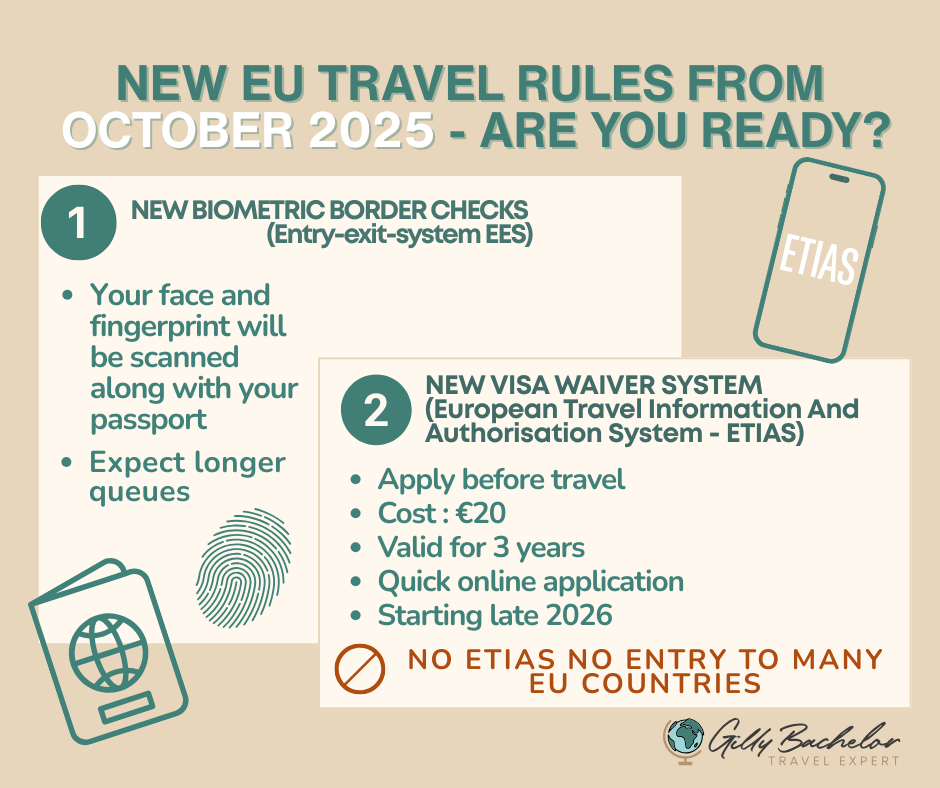Big changes are coming if you’re planning to holiday in Europe over the next few years — and it’s important that you are aware and there are no surprises at the border.
Gilly Bachelor was delighted to join an expert panel discussion on TRT World Roundtable — alongside travel journalist Simon Calder and ABTA’s Sean Tipton — exploring how the upcoming border changes will impact holidaymakers – watch the full interview here.
Here’s what’s happening, what it means for us as UK passport holders, and why you might want to plan ahead:
New Biometric Border Checks – Entry/Exit System (EES)
Start date: 12 October 2025
The EU will launch its new Entry/Exit System (EES) 12 October 2025. Instead of the old passport stamp, travellers from the UK (and other non‑EU countries) will have their facial image and four fingerprints taken digitally the first time they enter the Schengen area after launch. For children below 12 they will only have a facial image taken.
What to expect:
- The system will roll out gradually over six months in most Schengen countries (Ireland and Cyprus are excluded), plus Iceland, Norway, Liechtenstein and Switzerland.
- Data collected: your biometrics, passport details, and exact times you enter and exit.
- You may also be asked whether you have travel insurance – this isn’t a blanket requirement but please read here if you’re travelling by Eurostar.
- The aim is to speed things up in the long run — but initially, expect longer queues at airports, ferry ports (like Dover) and Eurostar terminals, especially while systems and staff bed in.
When the new Entry/Exit System (EES) is introduced next month, our advice is to allow extra time at the border and be prepared for longer waits than usual. We also anticipate that if queues become excessive, you may occasionally be ‘waved through’ without the full checks.
If this happens, it’s essential that you retain proof of travel (ideally boarding passes), because if your passport isn’t stamped, the system may incorrectly record you as having overstayed in the EU.
This matters because of the 90/180 day rule. In simple terms:
-
UK travellers (and other non-EU nationals without a visa) can only spend up to 90 days in any rolling 180-day period within the Schengen Zone (most EU countries).
-
The 180-day period is a moving window: every time you enter the EU, immigration looks back at the previous 180 days to see how many of those you’ve already spent there.
-
If you go over the 90-day allowance, you are classed as an overstayer — which can lead to fines, bans, or difficulties re-entering Europe in the future.
That’s why it’s so important to make sure your entry and exit are recorded correctly.

ETIAS Visa Waiver – Fee Set to Rise
Launch date: Late 2026
The European Travel Information and Authorisation System (ETIAS) will finally come into force late next year. UK travellers (and others from visa‑exempt countries) will need to apply online before travel.
Key details:
- New fee: €20 per applicant aged 18–70 (up from the originally proposed €7).
- Under‑18s and over‑70s will still apply but won’t pay.
- Valid for three years (or until your passport expires).
- Allows multiple trips: up to 90 days within a rolling 180‑day period.
Criminal Records & Other Red Flags
What you’ll be asked
When you apply for ETIAS, you’ll see three questions you must answer truthfully:
- Have you been convicted of certain criminal offences in the last 10 years (20 years for terrorism offences)?
- Have you stayed in a conflict zone in the last 10 years, and why?
- Have you been ordered to leave an EU country in the last 10 years?
If you answer “yes” (or even “maybe”) to any of these, it’s wise to apply as early as possible — ideally before you book your holiday — so there’s time to provide supporting info if needed.
Our Advice for Clients
- Travelling in 2025–2026? Factor in possible delays at borders, especially the first time you travel under the new system.
- Planning late 2026 onwards? Remember to budget for the new ETIAS fee and apply in good time.
- Have a complicated history? Get your ETIAS sorted well before booking, to avoid disappointment.
We’ll keep you updated as more details are confirmed — and of course, if you’d like personalised travel advice or help planning your trip, just get in touch.
And remember: as part of our service, we’ll be reminding all our clients about these changes and guiding you step by step on what needs to be done. We don’t want any surprises at the airport, ferry terminal, or train station — just smooth, stress‑free travel so you can relax and enjoy your holiday.
Call us on 01902 288104 we’re here to help!